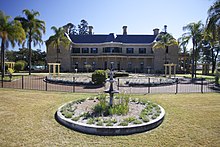Richard George Suter (25 April 1827 – 22 July 1894) was an English architect who migrated to Queensland, Australia. Many of his buildings are now heritage-listed.
Early life
Suter was baptized on 6 July 1827 at Holy Trinity Church, Newington, Surrey, the son of Richard Suter, an architect, and his wife Anne. His birth on 25 April of that year was recorded. He graduated as a Bachelor of Arts at Trinity College, Cambridge, in 1850, then trained as an architect under his father in London.
Architecture career

By 1865 Suter was working for Brisbane's leading architect Benjamin Backhouse while establishing his own practice. Suter was one of Queensland's most prolific and prominent architects of the late 19th century and was responsible for such grand designs as Jimbour House (Suter & Voysey 1873), St Mark's Anglican Church, Warwick (1867–70) and is recognised for his influence on the standard designs of schools in Queensland with the Board of Education using his designs almost exclusively until 1875.
Later life
After a decline in his success, Suter moved to Melbourne in 1876 and became a priest for the Catholic Apostolic Church. He died on 27 July 1894 at 114 Drummond Street, Carlton of heart disease.
Significant works
- 1867-1870: St Mark's Anglican Church, Warwick
- 1868-1869: St James Church of England, Toowoomba
- 1871: St Augustines Anglican Church, Leyburn
References
- Baptisms Solemnized in the Parish Church of the Holy Trinity, Newington, in the County of Surrey, no. 292, 6 July 1827, page 32
- ^ "Talgai Homestead (entry 600006)". Queensland Heritage Register. Queensland Heritage Council. Retrieved 1 August 2014.
- "Family Notices". The Argus. Melbourne: National Library of Australia. 28 July 1894. p. 1. Retrieved 14 May 2015.
- "St Marks Anglican Church (entry 600943)". Queensland Heritage Register. Queensland Heritage Council. Retrieved 17 January 2014.
- "St James Church (entry 601298)". Queensland Heritage Register. Queensland Heritage Council. Retrieved 1 August 2014.
- "St Augustines Anglican Church, Leyburn (entry 600828)". Queensland Heritage Register. Queensland Heritage Council. Retrieved 1 August 2014.
Attribution
![]() This Misplaced Pages article incorporates text from "The Queensland heritage register" published by the State of Queensland under CC-BY 3.0 AU licence (accessed on 7 July 2014, archived on 8 October 2014).
This Misplaced Pages article incorporates text from "The Queensland heritage register" published by the State of Queensland under CC-BY 3.0 AU licence (accessed on 7 July 2014, archived on 8 October 2014).